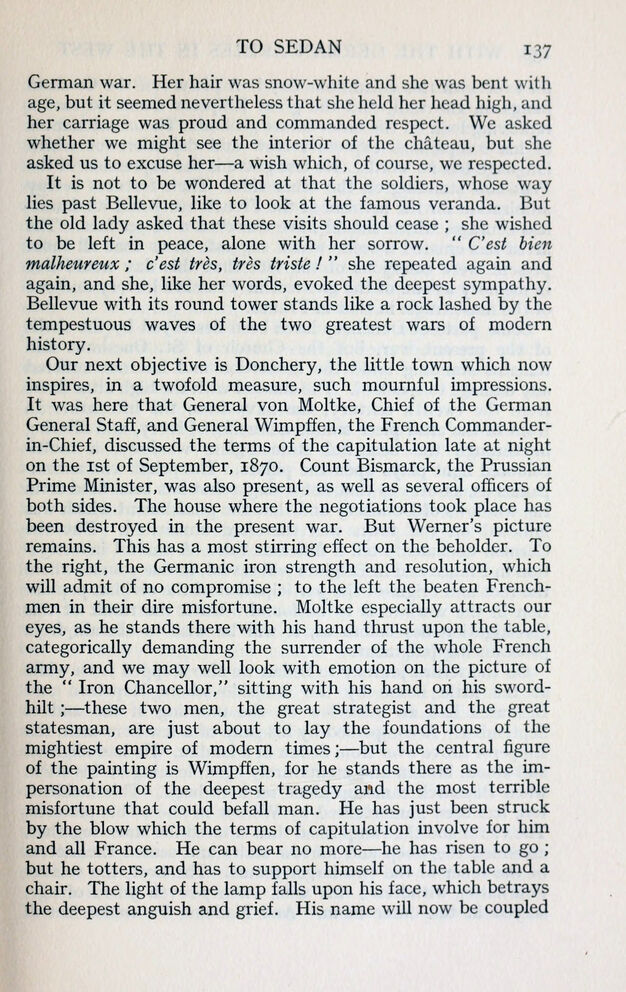
Full resolution (JPEG) - On this page / på denna sida - VII. To Sedan

<< prev. page << föreg. sida << >> nästa sida >> next page >>
Below is the raw OCR text
from the above scanned image.
Do you see an error? Proofread the page now!
Här nedan syns maskintolkade texten från faksimilbilden ovan.
Ser du något fel? Korrekturläs sidan nu!
This page has never been proofread. / Denna sida har aldrig korrekturlästs.
TO SEDAN 137
German war. Her hair was snow-white and she was bent with
age, but it seemed nevertheless that she held her head high, and
her carriage was proud and commanded respect. We asked
whether we might see the interior of the chateau, but she
asked us to excuse her—a wish which, of course, we respected.
It is not to be wondered at that the soldiers, whose way
lies past Bellevue, like to look at the famous veranda. But
the old lady asked that these visits should cease ; she wished
to be left in peace, alone with her sorrow. " Cest bien
malheureux ; c’est tres, tres triste ! " she repeated again and
again, and she, like her words, evoked the deepest sympathy.
Bellevue with its round tower stands like a rock lashed by the
tempestuous waves of the two greatest wars of modern
history.
Our next objective is Donchery, the little town which now
inspires, in a twofold measure, such mournful impressions.
It was here that General von Moltke, Chief of the German
General Staff, and General Wimpffen, the French Commander-
in-Chief, discussed the terms of the capitulation late at night
on the 1st of September, 1870. Count Bismarck, the Prussian
Prime Minister, was also present, as well as several officers of
both sides. The house where the negotiations took place has
been destroyed in the present war. But Werner’s picture
remains. This has a most stirring effect on the beholder. To
the right, the Germanic iron strength and resolution, which
will admit of no compromise ; to the left the beaten French-
men in their dire misfortune. Moltke especially attracts our
eyes, as he stands there with his hand thrust upon the table,
categorically demanding the surrender of the whole French
army, and we may well look with emotion on the picture of
the " Iron Chancellor," sitting with his hand on his sword-
hilt ; —these two men, the great strategist and the great
statesman, are just about to lay the foundations of the
mightiest empire of modem times ;
—but the central figure
of the painting is Wimpffen, for he stands there as the im-
personation of the deepest tragedy and the most terrible
misfortune that could befall man. He has just been struck
by the blow which the terms of capitulation involve for him
and all France. He can bear no more—he has risen to go ;
but he totters, and has to support himself on the table and a
chair. The light of the lamp falls upon his face, which betrays
the deepest anguish and grief. His name will now be coupled
<< prev. page << föreg. sida << >> nästa sida >> next page >>